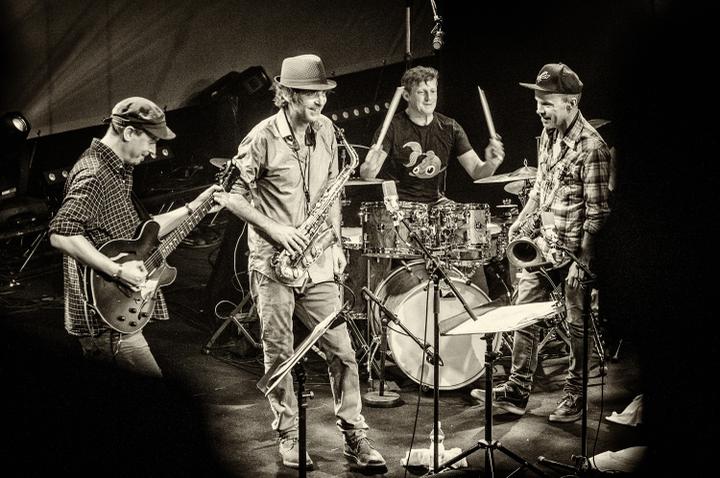Human Feel 'Gold' feat. Jim Black, Kurt Rosenwinkel, Chris Speed & Andrew D’Angelo (USA)
Jim Black: drums, electronics
Kurt Rosenwinkel: guitar
Chris Speed: tenor saxophone
Andrew D’Angelo: alto saxophone, bass clarinet
Human Feel have been together 30 years now, with no personnel changes in almost as long. Three members go back farther still, coming up together in Seattle before reconvening in Boston, where they teamed up with Kurt Rosenwinkel and bassist Joe Fitzgerald. When Joe left town in 1990 and Human Feel bemoaned the lack of a suitable replacement, he astutely told them, “You don’t need a bass player.” Such ideas were in the air. The luminous Motian Lovano Frisell drums/tenor/guitar trio helped point the way, little as Human Feel sounds like that band.
When its remaining members hit in New York in the early ’90s, established leaders scarfed them up quick: Motian, Dave Douglas, Tim Berne, Bobby Previte.... Sometimes, when a band moves to town and the players get plucked by name leaders, that band fades away. (Look up the MJT+3.) But Human Feel knew what they had. Part of the reason the players were in demand: They’d been developing individual and collective vocabularies in this very outfit, which went on to epitomize the ’90s downtown scene.
Jim Black’s rockish eighth-note feel never obstructed his jazz feel. Kurt Rosenwinkel was a great rock rhythm guitarist, sultry double-stopping jazz guitarist, stinging lead player, and sound-tool technician, sometimes two or three at once. Then there were those contrasting reedmen—Chris Speed’s funhouse mirror Warne Marsh to Andrew D’Angelo’s Lee Konitz with a blowtorch— and the rich recombinant possibilities of two saxophones and two clarinets. The way these two merge in cavernous unisons or near-unisons adds breathtaking sonic depth. They have the eccentric, thrilling blend of sibling singers. Like the Everly Brothers. Or the Shaggs.
Human Feel demonstrate all those elements on Gold, polished till it shines. Rosenwinkel’s “Bass Place” acknowledges the bassless sonic space, then pours in subtone guitar and bass clarinet to color the void. But you won’t often catch guitar, a low reed or bass drum filling an explicit bass function. As when Ornette set aside piano, the absence creates ambiguities of harmony and time, a freedom to exploit. As that Motian trio showed, it makes for a more slippery landscape.
That is a place where Human Feel feels right at home: the sweet spot they occupy so often. I love guitar’s parity with the horns when they improvise, and the curious calliope effect of guitar and reeds on the collective “Lights Out.” These players intuit, or work out in practice, the kind of rarefied overtone blending that spectral composers sweat out over sonographs. Jim Black powers the peppy anthems: his own “Stina Blues,” Andrew’s “Alar Vome” and his curveball “Eon Hit.” And they can still kick up the dust, like when they caught New York’s ears in the first place: Chris’s “Imaginary Friend.”
Pieces start in one place and wind around to another. “Numer” is fast changes and little gestures; then an unexpected plaintiveness. (The piece is Andrew’s, but that could almost describe Chris Speed’s m.o.: he’s stealthily effective in ensembles, not least on clarinet.) The D’Angelo tour de force “G_d” starts off in sanctified Ayler brothers territory, but the climbing-trellis ascending clarinet in the back half points you skyward: a yearning effect out of Ellington’s Sacred Concerts. Now there’s a comparison I never thought I’d make.In time, the players did spin farther apart. Everybody got busy with their own bands, and other people’s. Kurt got jazz famous, then moved to Europe. Andrew had a medical nightmare that sidelined him for years—coming back with a sustained burst of creativity. (Five tunes here are his.) Chris moved to Los Angeles (keeping one foot in Brooklyn), and started playing a 1929 Conn tenor with a wide-open wooden mouthpiece, tapping into ancient wisdom. Somewhere in or between his extensive travels, Jim added flexible electronics to his palette. Through it all Human Feel has carried on, and whenever they reconvene they have new musical stories to tell, and old ways of relating, of honing musical structures that depend on precision in the details yet leave much to be determined in performance.
Jim Black says, “We were joking recently we only make an album every 10 years now.” The last was Galore, recorded in 2006. “The past four years we’ve been getting together more often to work on new material, and to record when schedules allow. We had an amazing European tour in November 2017. The band just gets better without our working at it.
“I’m just happy we never disbanded due to petty-ego infighting, personal career competition issues, or all the myriad things that end so many great bands. We believe more than ever that the four of us making music together is a necessity, and we intend to keep doing it wherever and whenever we can.” (Kevin Whitehead / September 2018)


